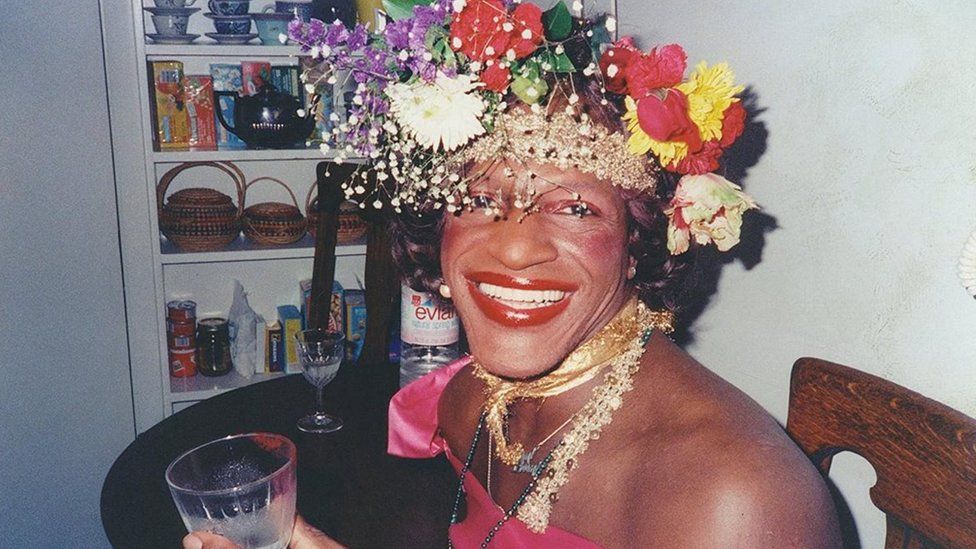Pride Month: Who was Marsha P. Johnson and why were they so important?
- Published

June is Pride Month, where people all over the world come together to celebrate the LGBTQ+ community and raise awareness for inequalities that still stand today.
But this year, the global Black Lives Matter anti-racism protests have encouraged people to shine a special light on the impact of black gay and trans activists.
One person you may have heard about in recent days is Marsha P. Johnson.
Marsha P. Johnson was a trans-rights activist who played a big role in important moments for the LGBTQ+ movement, such as the Stonewall protests.
Who was Marsha P. Johnson?
Marsha P. Johnson was an African-American gay man and drag artist - someone who dresses extravagantly and performs as a woman - from New Jersey, whose activism in the 1960s and 70s had a huge impact on the LGBTQ+ community.
At this time, being gay was classified as a mental illness in the United States. Gay people were regularly threatened and beaten by police, and were shunned by many in society.
Marsha said the "P" stood for "Pay it no mind" - a phrase they used when people commented negatively on their appearance or life choices.
LGBTQ+
LGBTQ+ stands for lesbian, gay, bi, trans and queer. The + is an inclusive symbol to mean 'and others' to include people of all identities.
In June 1969, when Marsha was 23 years old, police raided a gay bar in New York called The Stonewall Inn.
The police forced over 200 people out of the bar and onto the streets, and then used excessive violence against them.
In 2019, the head of New York's Police Department apologised for their actions, saying, "the actions taken by the NYPD were wrong".
Marsha, who was living and working in New York at the time, was one of the key figures who stood up to the police during the raids.
Marsha resisted arrest, but in the following days, led a series of protests and riots demanding rights for gay people.
Much like the recent Black Lives Matter marches in the United States, news of these protests spread around the world, inspiring others to join protests and rights groups to fight for equality.
A month after the protests, the first openly gay march took place in New York - a pivotal moment for the gay and trans community everywhere.
What impact did she have?
Even though the Stonewall riots kick-started this wave of support for the LGBTQ+ community, there was still a lot of discrimination against them.
It was common for young gay and trans people to be kicked out of their family homes by their parents.
Marsha and good friend Sylvia Rivera, who was also an activist , founded STAR - Street Transvestite Action Revolutionaries - an organisation to support gay and trans individuals who had been left homeless.
Much of Marsha's life was dedicated to helping others, despite suffering several mental health issues.
Marsha was nicknamed the "Saint of Christopher Street" (where the Stonewall Inn is located), because of the generosity they had shown towards people in New York's LGBTQ+ community.
What happened to Marsha?
Marsha went missing in 1992 and six days later police found Marsha's body. They said nobody else had been responsible for the death. But many friends argued this ruling at the time, saying attacks on gay and trans people were common.
Others said they saw Marsha being harassed by a group of "thugs" a few days before they died.
Twenty years later, in 2012, campaigner Mariah Lopez was successful in getting the New York police department to reopen Marsha's case as a possible murder.
After the NYPD reopened the case, the police reclassified Johnson's cause of death from "suicide" to undetermined.
Marsha's legacy lives on today in organisations such as the Marsha P. Johnson Institute, which says it "protects and defends the human rights of BLACK transgender people".
In February 2020, the Mayor of New York renamed the East River State Park in Brooklyn, The Marsha P. Johnson State Park and announced there will be a statue created in honour of Marsha, to be unveiled in 2021.
- Published1 June 2022
- Published6 July 2018
- Published9 June 2020
